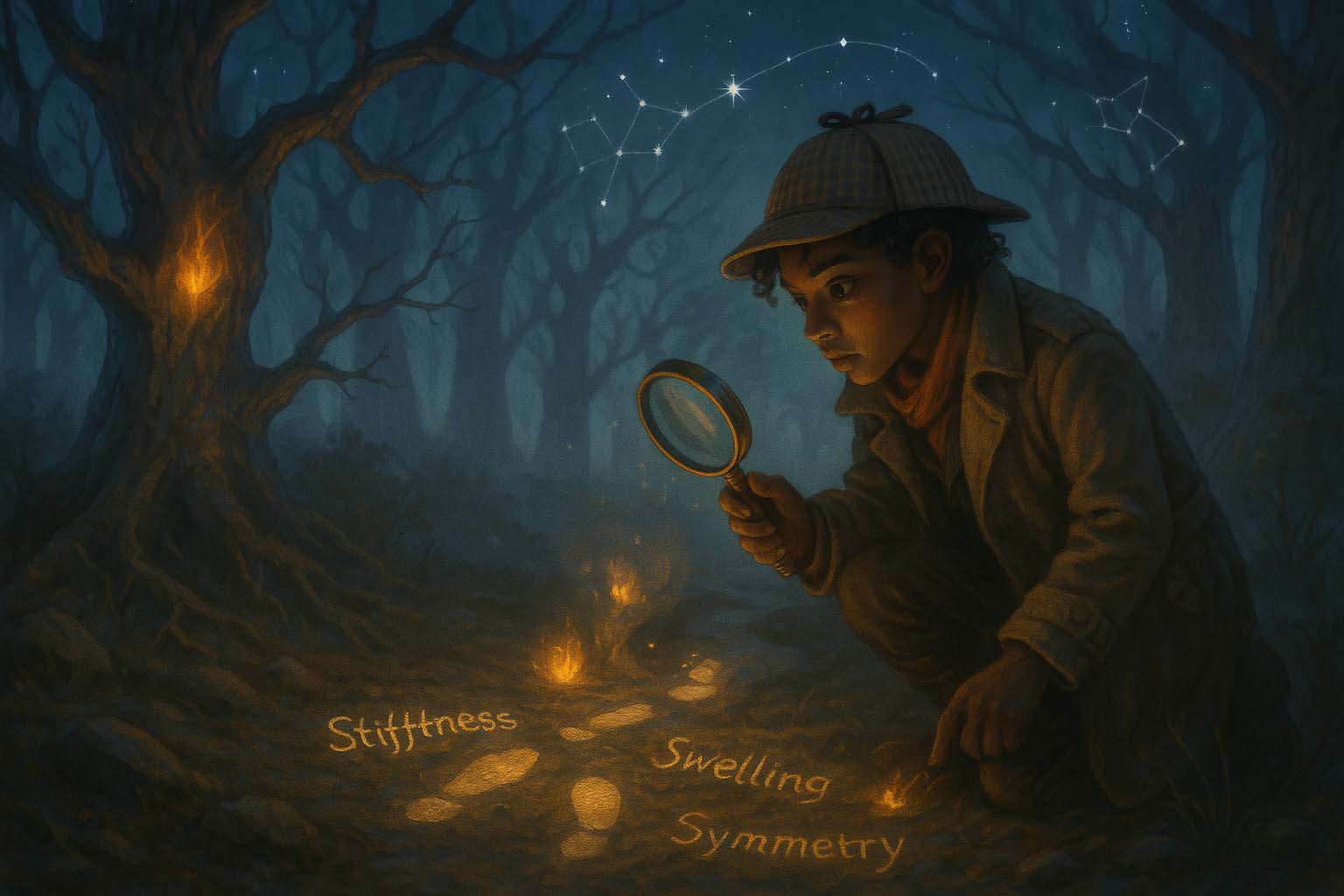
Rheumatology
- Posted by admin
- Categories Organ & Systems Medicine
- Date May 23, 2025
- Comments 0 comment
The Inflammation Detective’s Domain – Cracking the Cases of Stiffness, Swelling, and Silent Fires Within
1. Introduction: The Scene of the Specialty
Step into the shoes of a Rheumatology sleuth.
This is a field where clues smoulder rather than scream—where pain lingers, joints swell without warning, and the immune system turns detective into diplomat. Rheumatologists investigate the mysterious interface between inflammation and identity, seeking meaning in morning stiffness, subtle serologies, and chronic fatigue. Welcome to a world where a rash may foretell renal failure, and a swollen knee might signal a systemic revolt.
2. Key Mysteries They Solve (Common Conditions)
These detectives specialise in solving cases involving:
- Rheumatoid Arthritis – the classic symmetrical puzzle of pain, morning stiffness, and joint erosion.
- Systemic Lupus Erythematosus (SLE) – a master of disguise with clues in skin, blood, kidneys, and mood.
- Ankylosing Spondylitis & Spondyloarthropathies – axial pain and postural shift across time.
- Gout & Crystal Arthropathies – sharp clues from sudden, inflamed joints and lifestyle links.
Each diagnosis is a systemic investigation—immune misfires with complex motives and shifting evidence.
3. Their Trusted Tools & Techniques
Every detective has their kit—and in Rheumatology, tools may include:
- Clinical Pattern Recognition – the tempo, symmetry, and progression of joint involvement.
- Autoantibody Testing – ANA, RF, anti-CCP, ENA panels, and more.
- Joint Aspiration & Synovial Analysis – pulling fluid to reveal crystals, cells, or pathogens.
- Imaging & Ultrasound – to reveal erosions, effusions, and sacroiliitis.
Rheumatologists often find answers where others gave up—in histories too subtle to decode without time.
4. The Charms of This Field: Why It Captivates the Curious
- Immunological Intrigue: The immune system as saboteur, ally, and storyteller.
- Holistic Integration: Musculoskeletal meets renal, dermatological, haematological, and psychological.
- Chronic Partnerships: Build deep, trust-based care across months and years.
- Elegant Complexity: Puzzles that test your diagnostic reasoning, empathy, and clinical humility.
This is detective work at the slow burn—where inflammation writes its script in whispers and waves.
5. Challenges: The Toughest Cases They Face
- Subtle, Shifting Symptoms – Fatigue, malaise, and diffuse pain require careful listening.
- Delayed Diagnosis – Many autoimmune diseases unfold over time, not overnight.
- Psychosocial Toll – Chronic pain and disability take emotional and relational tolls.
- Immunosuppressive Risk – Balancing inflammation control with infection risk demands precision.
But the seasoned rheumatologist knows: healing begins with validation and long-view care.
6. Famous Cases and Hallmark Clues
- The “Classic Presentation” – Young woman with joint pain, photosensitivity, and proteinuria: Lupus.
- The “Zebra” – Sarcoidosis presenting with arthritis, uveitis, and erythema nodosum.
- The “Aha Moment” – A red, hot toe revealing gout in a man thought to have cellulitis.
7. Your Training Trail: How to Join the Investigation
To become a Rheumatology detective:
- Start with internal medicine—rheum clues often emerge across systems.
- Learn to trust pattern recognition over single lab results.
- Cultivate the skill of long-term management, including patient education and shared decision-making.
- Study immunology and pharmacology—DMARDs, biologics, and beyond.
Whether diagnosing an obscure vasculitis or adjusting methotrexate for morning stiffness, you’ll be walking alongside people for the long haul.
8. Final Words: The Signature of the Rheumatology Detective
Rheumatology detectives listen for pain’s pattern and inflammation’s logic.
They restore mobility where stiffness ruled, and calm immune systems when they rebel.
They are patient, persistent, and precise—because their cases unfold in months, not moments.
So if you’re drawn to detective work that requires time, trust, and tenacity—
then this is the fire you’re called to tend.



